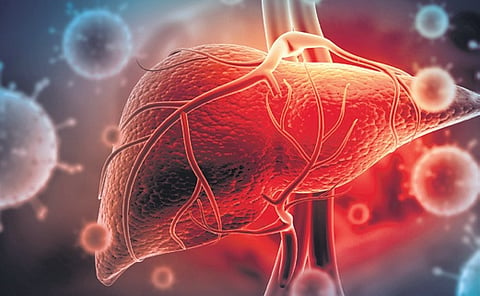

KOCHI: Despite multiple efforts to contain the spread of communicable diseases, Kerala continues to report a surge in Hepatitis A cases. The state recorded 3,227 confirmed cases and 16 deaths this year until April 16, with Ernakulam, Malappuram and, more recently Kozhikode, emerging as the worst-affected districts.
According to health experts, the spike indicates that the underlying reasons for the spread of the disease have not been addressed effectively.
“While the health authorities and local bodies are super-chlorinating water sources in affected areas, this measure alone is insufficient. Super-chlorinating just a few water bodies cannot contain the overall spread. The increase in cases suggests that drinking water sources are being contaminated with sewage. We need consistent efforts to clean and purify water sources,” said Dr Rajeev Jayadevan, convenor of the Indian Medical Association Research Cell, adding that illegal waste dumping must be curbed and a scientifically proven method for septic waste disposal must be implemented.
In 2024, the state recorded 7,943 Hepatitis A cases and 81 deaths, with multiple outbreaks reported, especially in Malappuram and Ernakulam’s Vengoor. “The disease tends to spread during summer when there is a water scarcity. People often end up consuming contaminated water when clean water is unavailable.
Mere filtration and treatment methods may also prove ineffective,” said Dr Anish T S, professor with the Department of Community Medicine at Government Medical College, Kozhikode. “The general population here has low immunity to the disease.
The elderly population, especially those with existing conditions such as lifestyle disease, fatty liver and alcoholism, are at higher risk, compared to children. These factors can cause serious complications and even prove fatal,” he added.
Meanwhile, public awareness about the condition and its complications has led to an increase in testing. “Hepatitis A vaccines are available, however, they involve out-of-pocket expenses and are not included in the national vaccination programme. Those who haven’t had a prior infection or vaccine must consider getting vaccinated,” Dr Rajeev advised.
Stressing the need for a multi-pronged intervention to tackle the spread, Dr Anish said, “We must strengthen sewage treatment and develop a more systematic waste management framework to prevent soil and water contamination.”
With the arrival of the monsoon, experts caution about an increased risk of other waterborne diseases such as leptospirosis and dengue due to possible flooding.
Avoid self-medication
According to Dr Rajeev, treatment should be sought at the earliest if a person develops symptoms. “Relying on traditional and home remedies for viral hepatitis will invite complications. Delaying treatment can lead to organ damage, including kidney failure from dehydration. The patient should get prompt medical attention. Early detection and hospitalisation, if necessary, can save lives,” he said.